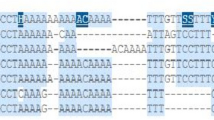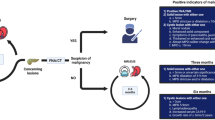Abstract
Background
The presence of advanced adenomas in younger individuals is a criterion for Lynch syndrome (LS). However, the utility of screening advanced adenomas for loss of mismatch repair (MMR) protein expression to identify suspected LS remains unclear.
Aims
Determine the prevalence of MMR defects to understand whether these patients harbor a defined genetic risk for CRC.
Methods
The study cohort included adult patients ≤45 years of age with advanced adenomas (villous histology, ≥1 cm in diameter, ≥3 polyps of any size) endoscopically removed between 2001 and 2011. Clinical records were reviewed along with detailed pathological review and immunohistochemical MMR analysis.
Results
A total of 76 (40.1 % male, age 40.6 ± 5.4 years) patients met inclusion and exclusion criteria. Indications for colonoscopy were gastrointestinal (GI) bleeding 39 (51.3 %), CRC in a first-degree relative 17 (22.4 %) and somatic GI symptoms 20 (26.3 %). Index colonoscopy revealed a median of 1 adenoma (range 1–4), mean diameter of 12.9 ± 7.1 mm, 40 (52.6 %) with villous histology. The mean follow-up duration was 3.3 ± 2 years. Recurrent adenomas developed in 24 (31.6 %), of which 8 (10.5 %) were advanced adenomas; none of these patients developed CRC. One of 66 (1.5 %) adenomas available for immunohistochemical (IHC) testing revealed loss of MLH1 and PMS2.
Conclusions
IHC screening of advanced adenomas from patients younger than 45 years of age identified potential LS in one of 64 patients. The low yield of IHC screening in this population suggests that universal IHC screening of advanced adenomas from patients younger than 45 years of age for MMR defects is not an efficient strategy for identifying LS subjects.



Similar content being viewed by others
References
Siegel R, Naishadham D, Jemal A. Cancer statistics, 2012. CA Cancer J Clin. 2012;62:10–29.
Center MM, Jemal A, Ward E. International trends in colorectal cancer incidence rates. Cancer Epidemiol Biomarkers Prev. 2009;18:1688–1694.
Michor F, Iwasa Y, Lengauer C, et al. Dynamics of colorectal cancer. Semin Cancer Biol. 2005;15:484–493.
Huang CS, Farraye FA, Yang S et al: The clinical significance of serrated polyps. Am J Gastroenterol 2011, 106:229–240; quiz 241.
Vogelstein B, Fearon ER, Hamilton SR, et al. Genetic alterations during colorectal-tumor development. N Engl J Med. 1988;319:525–532.
Ahnen DJ. The American College of Gastroenterology Emily Couric Lecture–the adenoma-carcinoma sequence revisited: has the era of genetic tailoring finally arrived? Am J Gastroenterol. 2011;106:190–198.
Levin B, Lieberman DA, McFarland B, et al. Screening and surveillance for the early detection of colorectal cancer and adenomatous polyps, 2008: a joint guideline from the American Cancer Society, the US Multi-Society Task Force on Colorectal Cancer, and the American College of Radiology. CA Cancer J Clin. 2008;58:130–160.
Farraye FA, Odze RD, Eaden J, et al. AGA medical position statement on the diagnosis and management of colorectal neoplasia in inflammatory bowel disease. Gastroenterology. 2010;138:738–745.
Rex DK, Johnson DA, Anderson JC, et al. American College of Gastroenterology guidelines for colorectal cancer screening 2009 [corrected]. Am J Gastroenterol. 2009;104:739–750.
Thoma MN, Castro F, Golawala M, et al. Detection of colorectal neoplasia by colonoscopy in average-risk patients age 40–49 versus 50–59 years. Dig Dis Sci. 2011;56:1503–1508.
Imperiale TF, Wagner DR, Lin CY, et al. Results of screening colonoscopy among persons 40 to 49 years of age. N Engl J Med. 2002;346:1781–1785.
Stoffel EM, Syngal S. Adenomas in young patients: what is the optimal evaluation? Am J Gastroenterol. 2005;100:1150–1153.
Laiyemo AO, Murphy G, Albert PS, et al. Postpolypectomy colonoscopy surveillance guidelines: predictive accuracy for advanced adenoma at 4 years. Ann Intern Med. 2008;148:419–426.
Saini SD, Kim HM, Schoenfeld P. Incidence of advanced adenomas at surveillance colonoscopy in patients with a personal history of colon adenomas: a meta-analysis and systematic review. Gastrointest Endosc. 2006;64:614–626.
Jasperson KW, Tuohy TM, Neklason DW, et al. Hereditary and familial colon cancer. Gastroenterology. 2010;138:2044–2058.
Umar A, Boland CR, Terdiman JP, et al. Revised Bethesda Guidelines for hereditary nonpolyposis colorectal cancer (Lynch syndrome) and microsatellite instability. J Natl Cancer Inst. 2004;96:261–268.
Edelstein DL, Axilbund J, Baxter M, et al. Rapid development of colorectal neoplasia in patients with Lynch syndrome. Clin Gastroenterol Hepatol. 2011;9:340–343.
Jarvinen HJ, Aarnio M, Mustonen H, et al. Controlled 15-year trial on screening for colorectal cancer in families with hereditary nonpolyposis colorectal cancer. Gastroenterology. 2000;118:829–834.
de Jong AE, Hendriks YM, Kleibeuker JH, et al. Decrease in mortality in Lynch syndrome families because of surveillance. Gastroenterology. 2006;130:665–671.
Geiersbach KB, Samowitz WS. Microsatellite instability and colorectal cancer. Arch Pathol Lab Med. 2011;135:1269–1277.
Beamer LC, Grant ML, Espenschied CR, et al. Reflex immunohistochemistry and microsatellite instability testing of colorectal tumors for Lynch syndrome among US cancer programs and follow-up of abnormal results. J Clin Oncol. 2012;30:1058–1063.
Morrison J, Bronner M, Leach BH, et al. Lynch syndrome screening in newly diagnosed colorectal cancer in general pathology practice: from the revised Bethesda guidelines to a universal approach. Scand J Gastroenterol. 2011;46:1340–1348.
Velayos FS, Allen BA, Conrad PG, et al. Low rate of microsatellite instability in young patients with adenomas: reassessing the Bethesda guidelines. Am J Gastroenterol. 2005;100:1143–1149.
Shia J, Klimstra DS, Nafa K, et al. Value of immunohistochemical detection of DNA mismatch repair proteins in predicting germline mutation in hereditary colorectal neoplasms. Am J Surg Pathol. 2005;29:96–104.
Halvarsson B, Lindblom A, Johansson L, et al. Loss of mismatch repair protein immunostaining in colorectal adenomas from patients with hereditary nonpolyposis colorectal cancer. Mod Pathol. 2005;18:1095–1101.
Kang KJ, Min BH, Ryu K, et al. Clinical usefulness of microsatellite instability test in Korean young patients with high-risk features associated with adenoma. Clin Res Hepatol Gastroenterol. 2012;36:378–383.
Jiang H, Fine JP. Survival analysis. Methods Mol Biol. 2007;404:303–318.
Jarvinen HJ, Renkonen-Sinisalo L, Aktan-Collan K, et al. Ten years after mutation testing for Lynch syndrome: cancer incidence and outcome in mutation-positive and mutation-negative family members. J Clin Oncol. 2009;27:4793–4797.
Stupart DA, Goldberg PA, Algar U, et al. Surveillance colonoscopy improves survival in a cohort of subjects with a single mismatch repair gene mutation. Colorectal Dis. 2009;11:126–130.
Rodriguez-Bigas MA, Boland CR, Hamilton SR, et al. A National Cancer Institute Workshop on Hereditary Nonpolyposis Colorectal Cancer Syndrome: meeting highlights and Bethesda guidelines. J Natl Cancer Inst. 1997;89:1758–1762.
De Jong AE, Morreau H, Van Puijenbroek M, et al. The role of mismatch repair gene defects in the development of adenomas in patients with HNPCC. Gastroenterology. 2004;126:42–48.
Loukola A, Salovaara R, Kristo P, et al. Microsatellite instability in adenomas as a marker for hereditary nonpolyposis colorectal cancer. Am J Pathol. 1999;155:1849–1853.
Walsh MD, Buchanan DD, Pearson SA, et al. Immunohistochemical testing of conventional adenomas for loss of expression of mismatch repair proteins in Lynch syndrome mutation carriers: a case series from the Australasian site of the colon cancer family registry. Mod Pathol. 2012;25:722–730.
Yurgelun MB, Goel A, Hornick JL, et al. Microsatellite instability and DNA mismatch repair protein deficiency in Lynch syndrome colorectal polyps. Cancer Prev Res. 2012;5:574–582.
Goel A, Nagasaka T, Spiegel J, et al. Low frequency of Lynch syndrome among young patients with non-familial colorectal cancer. Clin Gastroenterol Hepatol. 2010;8:966–971.
Winawer SJ, Fletcher RH, Miller L, et al. Colorectal cancer screening: clinical guidelines and rationale. Gastroenterology. 1997;112:594–642.
van Heijningen EMB, Lansdorp-Vogelaar I, Kuipers EJ, et al. Features of adenoma and colonoscopy associated with recurrent colorectal neoplasia based on a large community-based study. Gastroenterology. 2013;144:1410–1418.
Schatzkin A, Lanza E, Corle D, et al. Lack of effect of a low-fat, high-fiber diet on the recurrence of colorectal adenomas. New Engl J Med. 2000;342:1149–1155.
Acknowledgments
Supported in part by (NIHMS320979) (VMK) and Grants DK-52574, DK-56260 and HL-38180 to (NOD). This work was also supported by funding from the Buehrle Family fund and the Gale Family fund for colorectal cancer research.
Conflict of interests
None.
Author information
Authors and Affiliations
Corresponding author
Rights and permissions
About this article
Cite this article
Kushnir, V.M., ILKe Nalbantoglu, Watson, R. et al. Advanced Colorectal Adenomas in Patients Under 45 Years of Age Are Mostly Sporadic. Dig Dis Sci 59, 2757–2764 (2014). https://doi.org/10.1007/s10620-014-3245-9
Received:
Accepted:
Published:
Issue Date:
DOI: https://doi.org/10.1007/s10620-014-3245-9




